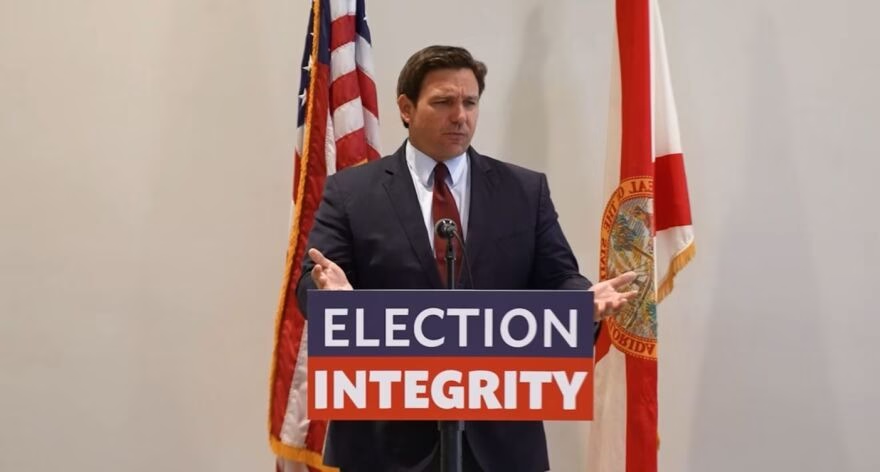On January 11th, Florida Governor Ron DeSantis delivered his State of the State address to the Florida legislature. Amid the usual talk of public education, taxes, and unemployment, DeSantis proposed the creation of an “election integrity unit” that would “facilitate the faithful enforcement of election laws.” DeSantis first announced the “Office of Election Crime and Security” in December, with a proposed budget of $6 million and a 52-person staff.
Unsurprisingly, the reaction from DeSantis critics and voting rights advocates was swift. A Washington Post article on the new police force quoted a voting rights lawyer who said “My number one concern is that this is going to be used as a tool to harass or intimidate civic-engagement organizations and voters,” and Florida Democrats who noted “a disturbing rise in partisan efforts at voter suppression,” citing the proposal.
The critics are right—in part. Voter fraud is extremely uncommon, and why Florida needs a dedicated police force seems to have less to do with election integrity than political posturing. Still, any focus on voter suppression seems to be missing the point. The agency itself may aid voter suppression, but that’s not why DeSantis is creating it. It is actually a facet of the right-wing media narrative that voter fraud is widespread, and this agency is purpose-built to supercharge it.
The trouble with Donald Trump’s claim that the 2020 election was stolen from him is that it’s not true. The trouble for Republican politicians like Ron DeSantis is that 71% of Republicans believe it anyway. Caught in the middle between Republican stardom and reality, DeSantis must seem tough on voter fraud without actually investigating it exhaustively. When that’s happened before, even groups amenable to Republicans’ claims have repeatedly discredited mass voter fraud allegations. Statistics won’t work, but anecdotes might.
By investigating and prosecuting individual reports of voter fraud, the Office of Election Crime and Security is guaranteed to drive headlines. With 52 employees whose livelihoods are on the line, how small or unfounded will an allegation have to be to gain the attention of the new agency?
This agency may come into existence exactly because voter fraud is uncommon. When it doesn’t happen often, you have to dig harder, search wider, and discuss longer about what may or may not be happening. All the while, media outlets wishing to promote the myth of mass voter fraud will be given their daily fodder, as they were in the around the 2020 election when headlines jumped from destroyed military ballots in Pennsylvania to Sidney Powell’s assertion that a supercomputer hacked into voting machines, to the claims that Dominion, which builds voting machines, is linked to Venezuela or Antifa.
This agency may be the first of its kind, but it is aiming to replicate a well-known phenomenon in media manipulation: if you over-report on a subject, people will come to think that thing is becoming more common. Take the example of violent crime. During the 1990s, TV news outlets increased their coverage of violent crime despite the fact that crime rates were dropping. Over a three year period, murder rates decreased 20 percent nationally as ABC, CBS, and NBC increased the time they devoted to discussing murders by 721 percent. From 2001 to 2010, the violent crime rate dropped by almost half, but the proportion of Americans who stated there was more crime than a year earlier increased consistently over the same period from 47 percent to 68 percent. Under the right circumstances, media narratives can matter more than reality, and Ron DeSantis aims to deliver.
Our elections are under assault, but it is not all about ballot access. The lie that our elections are not legitimate is a cancer in our democracy that will spread if not consistently defeated, and the proposed Office of Election Crime and Security is its latest permutation. This agency—ostensibly proposed to defend elections and boost voters’ confidence that elections are conducted fairly—will have the opposite effect. This is how lies are made.


